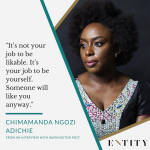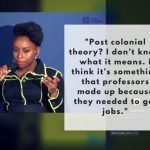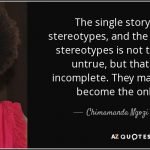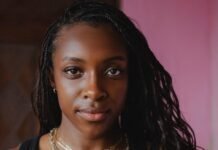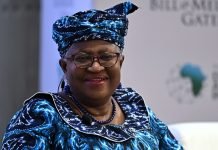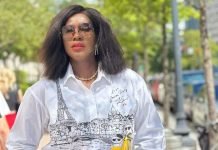Chimamanda Ngozi Adichie, a Nigerian novelist, actress and writer of short stories was born on 15 September 1977, the fifth of six children of Prof. James Adichie, a professor at the University of Nigeria, Nsukka and the first Nigerian professor of Statistics, and his wife, Dr (Mrs) Ijeoma Adichie, the first female registrar of the same institution.

The Adichie’s come from Abba in Njikoka Local Government Area of Anambra State of Nigeria.
Chimamanda, (her Igbo name meaning, “my God will not fail me” which perhaps is the etymological root of the English name “Amanda”) has written so many world-class novels and essays including, Purple Hibiscus (2003), Half of a Yellow Sun (2006) – which later was the inspiration of a fiction drama love story film centered on the story of the struggles during the Biafran-Nigerian civil war. The movie featured great artistes such as Chiwetel Ejiofor, Onyeka Onwenu and Genevieve Nnaji.
“I am trying to unlearn many lessons of gender I internalized while growing up. But I sometimes still feel vulnerable in the face of gender expectations.”

Other books Chimamanda authored are Americanah (2013), a short story collection, The Thing Around Your Neck (2009), and the book-length essay, We Should All Be Feminists (2014), which was used in Beyonce’s song, Flawless, among many other works. Her most recent book, Dear Ijeawele, or a Feminist Manifesto in Fifteen Suggestions, was published in March 2017.
Young Chiamanda, grew up in the university town of Nsukka where her parents were working then, and infact lived in the same house once occupied by the literary giant, late Chinua Achebe, author of the world’s bestseller, Things Fall Apart. Chimamanda and Achebe were to later meet in the United States where the late legend served as a mentor to the young writer.
Chimamanda completed her secondary education at the University of Nigeria Secondary School, receiving several academic prizes. After, she went on to study medicine at the University of Nigeria but ran the program for just a year and six months before getting a scholarship to study in the United State. During her brief stay at the medical college though, she was the editor of the catholic medical students’ magazine – The Compass.

“Of course I am not worried about intiMIDating men. The type of man who will be intimidated is exactly the type of man I have no interest in”.
Personal life and education

She was admitted to study communications and political science at Drexel University in Philadelphia but later transferred to Eastern Connecticut State University to be near her sister Uche, who then was a medical doctor at Coventry.
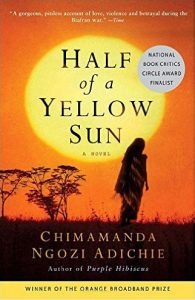 Chimamanda, in her book Americanah used her book’s character to illustrate her cultural shock when she first arrived the United States and her confrontations with racism and colour relations in the U.S. which she was ignorant off back in her homeland.
Chimamanda, in her book Americanah used her book’s character to illustrate her cultural shock when she first arrived the United States and her confrontations with racism and colour relations in the U.S. which she was ignorant off back in her homeland.
She received a bachelor’s degree from Eastern Connecticut State University, with the distinction of summa cum laude in 2001 and went on in 2003 to receive her master’s degree in creative writing at Johns Hopkins University. In 2008, she got a second Master of Arts degree in African studies from the Ivy League college, Yale University.
“Please love by giving and by taking. Give and be given. If you are only giving and not taking, you’ll know. You’ll know from that small and true voice inside you that we females are so often socialized to silence. Don’t silence that voice. Dare to take.”
Adichie was a Hodder fellow at Princeton University during the 2005–06 academic year. In 2008 she was awarded a MacArthur Fellowship. She was also awarded a 2011–12 fellowship by the Radcliffe Institute for Advanced Study, Harvard University, among too many awards and recognition too many for this article.

In 2016 however, she was conferred an honorary degree – Doctor of Humane letters, honoris causa, by Johns Hopkins University. In 2017 she was yet again conferred honorary degrees – Doctor of Humane letters, honoris causa, by Haverford College, The University of Edinburgh.
She was named as one of “100 Most Influential People” in 2015 by Time magazine.

Although an avowed feminist, she was later to marry Dr Ivara Esegee, a Nigerian-Scottish mixed race medical doctor at Baltimore, Maryland, United States. Ivara is from Abi (an Igbo subgroup) of Cross Rivers State, Nigeria. His mum is Scottish. Both died in a car accident in the 1980’s. Dr Ivara too studied medicine back at the University of Nigeria, and it is still speculative if Ivara’s romance with the renowned novelist dated back then. No word from both sides.
Although Chimamanda Adichie is happily married, she refuses to accept the appendage title “Mrs” to her name, insisting on “Miss”, and has even refused to adopt her husbands name. They are blessed with a lovely daughter, born in 2015, whose name Chimamanda has kept secret.
“Culture does not make people. People make culture. If it is true that the full humanity of women is not our culture, then we can and must make it our culture.”
Ms Adichie, has made a global reputation for her social activism in support of civil rights of the LGBQT community and in particular of promoting feminist agenda. In a 2014 interview, Adichie said of feminism and writing, “I think of myself as a storyteller, but I would not mind at all if someone were to think of me as a feminist writer… I’m very feminist in the way I look at the world, and that world view must somehow be part of my work.”
She insists everyone should be a feminist and even questions the stereotypical way that parents bring up male and female children differently, and argues that this sets the stage for the different gender expectations, standards and barriers in society, which tends to marginalize and discriminate against women.
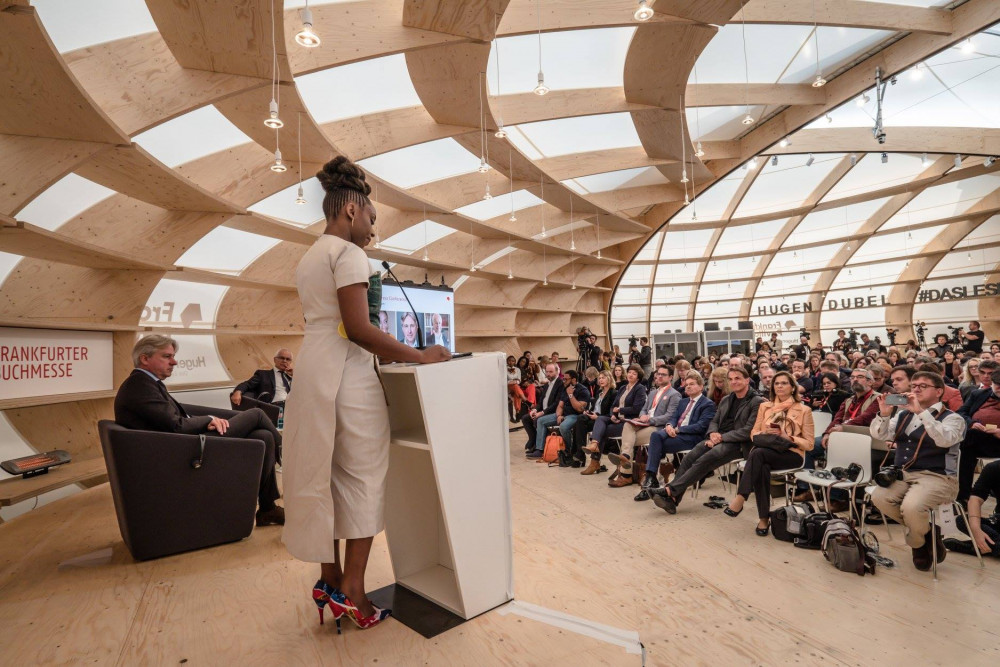
Chimamanda lives in the United States although she is often back home in Nigeria where she sometimes gives speeches at creative workshops to inspire Nigerian young and upcoming writers.
In 2018, she stirred up a global firestorm on social media video of her interview with American First Lady, Mrs Hillary Clinton during a PEN World Voices Festival went viral. In the interview Chimamanda drilled the ex-First Lady, “In your Twitter account, the first word that describes you is ‘Wife.’… And when I saw that, I have to confess that I felt just a little bit upset. And then I went and I looked at your husband’s Twitter account, and the first word was not ‘husband.’”. Clinton smiled and promised to reorder the sequence of her bio titles in her twitter account, and indeed kept the promise but not without outrage around the world from those who thought Chimamanda’s feminism were over-reaching into the rights of those who do not share her beliefs.
“Some people ask: ‘Why the word feminist? Why not just say you are a believer in human rights, or something like that?’ Because that would be dishonest. Feminism is, of course, part of human rights in general—but to choose to use the vague expression human rights is to deny the specific and particular problem of gender. It would be a way of pretending that it was not women who have, for centuries, been excluded. It would be a way of denying that the problem of gender targets women.”
Chimamanda Ngozi Adichie, remains a deeply admired and respected writer world over. Accolades are streaming from all sides globally. And her Nigerian people especially, and indeed people of African descent remain immensely proud of her talents and achievements, even if they disagree with some of her worldviews.
Below are additional interesting quotes from Ms Adichie, one of the world’s most enigmatic, talented, cerebral, inspiring, and permit us to add, beautiful personalities of African descent. We are proud to make her the JolibaLive PERSON OF THE DAY for Sunday 14 October 2018.



